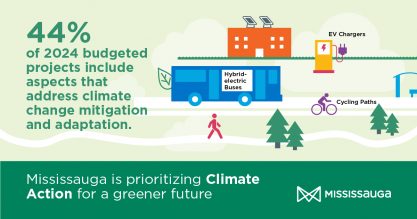Milder winter and dreary weather highlight climate change concerns for Mississauga
Environment | January 10, 2024
Have you noticed that this winter is more mild than usual with minimal snow? Although the presence of a strong El Niño is one of the reasons for the warm winter, climate change is another significant factor causing the shift in temperatures. Climate change is causing milder winter temperatures across the country. Hotter, wetter and more extreme weather events are predicted for Mississauga in the near future.
In 2023, Mississauga saw warm weather in the spring, a hotter summer affected by wildfire smoke, milder than average temperatures in the fall and a warmer start to winter with minimal snow.
According to the UN’s State of the Global Climate Report, the past nine years (2014-2023) have been the warmest on record. Compared to other countries, Canada is warming twice as fast.
Environment and Climate Change Canada predicts a 50 to 60 per cent chance of above-normal temperatures from January through March. Every degree of temperature change, even one degree warmer, can impact our environment significantly. This could mean more flooding, wildfires or intense heat waves.
Snow matters
The impacts of warmer winters and higher than average annual temperatures are significant. Snow acts as insulation, helping to protect plants and animals from the cold temperatures. Melted snow also provides plants with water and replenishes streams and rivers. However, if the snow melts too quickly, it can cause flooding and erosion.
Soil also tends to stay warmer and wetter when there is less snow. This leads to the soil thawing earlier than usual, which can trigger premature growth in plants. Although this may not seem like a big deal, plants may start to grow too early and be vulnerable to late frosts and freezes, which can damage or kill them. This can have a ripple effect throughout the ecosystem, as many animals rely on these plants for food and shelter. This can lead to crop failure and affect our farming and food supply.
Changes in climate can also affect the spread of invasive plants and animals. Extreme weather events like droughts can stress native species. At the same time, rising temperatures can allow the movement or increased success of invasive species from warmer climates into areas with traditionally colder climates. This increase in favourable conditions for invasive species may threaten the biodiversity and wildlife in Mississauga.
Snow and winter weather can have a significant impact on wildlife and habitats. For some animals, such as rabbits, snowy owls, and coyotes, their winter coats help them blend in with the snow. Other animals, like deer, rely on snow to stay hydrated when other water sources, like the Credit River, are frozen over.
Climate projections for Mississauga
While a strong El Niño is partially responsible for the mild forecast this year, warmer winters for the past few years are due to climate change.
A 2023 assessment of climate-related risks from the City of Mississauga provides more details on climate projections. Temperatures are trending warmer across all seasons. The average annual temperature is expected to increase by 3.4 degrees Celsius in the 2050s and 5.7 degrees Celsius in the 2080s.
Rainfall is also expected to increase in volume and intensity, with more frequent and intense precipitation. Projections also include hotter summers, a decrease in snow during winter and the timing of seasons is expected to shift. Extreme events like lightning and thunderstorms, snowstorms, freezing rain, hail, powerful winds, droughts, wildfires, flooding and storm surges are expected to become more intense due to a warmer and hotter future climate.
Actions we can take to slow climate change
With all these alarming projections, everyone needs to take steps to reduce carbon emissions and adopt sustainable practices to mitigate the effects of climate change.
Each of us has the power to turn things around with the choices we make to reduce our carbon footprint. Making informed choices is more important now than ever. Actions you take now can impact future generations – including your children, grandchildren and great-grandchildren.
These actions can include switching to using an electric vehicle, using electric heat pumps for heating and cooling, using sustainable transportation like walking, biking or public transit, reducing your waste, shopping local and eating more plant-based foods.
This year, 44 per cent of the City’s budgeted projects will have some aspect of climate change mitigation and adaptation. These projects will include hybrid buses, park acquisitions, electric-vehicle charging stations, bike lanes, sidewalks, buildings with solar panels, and more. This capital spending of almost $263 million will help advance Mississauga’s goal of achieving net zero.
We know we can’t do it alone. The City is also collaborating with different levels of government, corporations, non-profit organizations, community partners, and residents to make this happen. These investments will lead to cleaner air, less traffic and healthier neighbourhoods.
Investing in these meaningful actions will help us reduce greenhouse gas emissions, and create a greener, more resilient Mississauga.
By supporting these types of investments, the City is strongly committed to building a more sustainable and prosperous future. Taking action today can ensure a better tomorrow.
To learn more about the City’s Climate Change Action Plan and its progress, please visit mississauga.ca/projects-and-strategies/city-projects/climate-change-action-plan.
Tags
Media contact
City of Mississauga Media Relations
media@mississauga.ca
905-615-3200, ext. 5232
TTY: 905-896-5151





